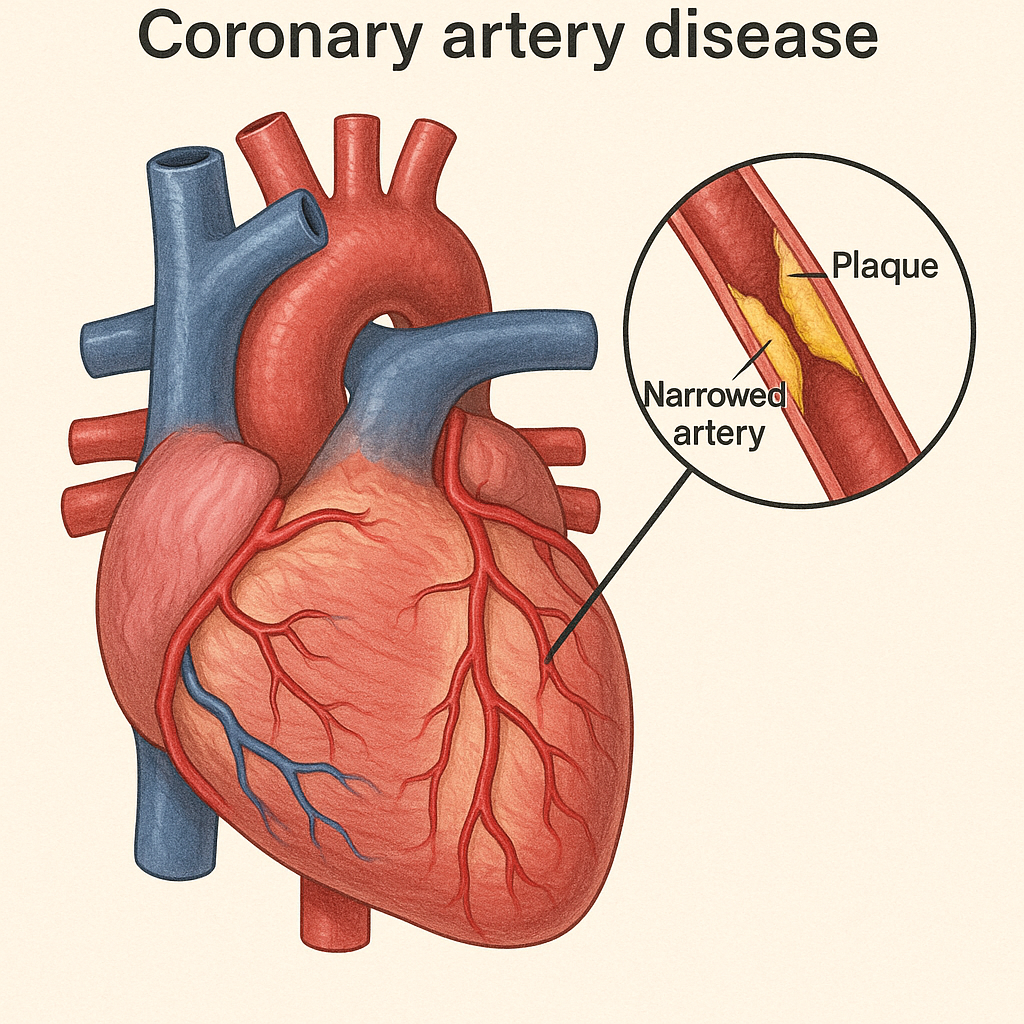
Ischemic heart disease
What kind of disease is it?
Who does it affect?
What are its symptoms, diagnosis, and treatment options?
Are you looking for answers about this disease for yourself or your loved ones? We are here to provide you with the most reliable information for exactly that purpose.
Ischemic Heart Disease — as its name suggests — is a heart-related condition. It is the most common type of heart disease in Uzbekistan, and according to World Health Organization studies, 43% of all annual deaths in Uzbekistan are caused by this disease.
This condition usually occurs when the coronary arteries — the blood vessels supplying the heart muscle — cannot deliver enough blood, oxygen, and nutrients to the heart. The main cause is almost always cholesterol buildup or plaque formation. These deposits narrow the blood vessels, reducing blood flow to the heart. This can lead to chest pain, shortness of breath, and even a heart attack. Ischemic Heart Disease typically develops slowly over time, which is why many patients do not realize they have it until they start experiencing clinical symptoms.
Anyone can develop Ischemic Heart Disease.
It begins with the buildup of fats, cholesterol, and other substances in the artery walls — a process called atherosclerosis. This is not always immediately dangerous, but excessive accumulation of these materials can block blood flow.
There are several risk factors for developing Ischemic Heart Disease.
First, aging: as we grow older, arteries become more damaged and narrow, which can lead to disease progression.
In addition, men are generally at a higher risk compared to women. However, women’s risk increases after menopause.
Other chronic conditions also play a role.
- High blood pressure can thicken blood vessel walls, reducing blood flow.
- High cholesterol levels accelerate plaque buildup.
- Diabetes and obesity also increase the risk.
Lifestyle factors are equally important. Low physical activity, prolonged stress, unhealthy eating habits, and smoking all raise the risk.
If close relatives have been diagnosed with heart disease at an early age, your risk is higher as well.
When coronary arteries narrow, the heart receives less oxygen-rich blood. It’s important to remember that the heart must supply blood not only to other organs but also to itself. If your heart has to work harder with less blood, you may start feeling pressure or squeezing pain in the chest — a symptom called angina. This may feel as though someone is pressing on your chest. If your heart cannot pump enough blood for your body’s needs, you may experience shortness of breath or extreme fatigue during physical activity. If an artery becomes completely blocked, it can cause a heart attack.
Typical symptoms of a heart attack include crushing chest pain, pain in the shoulder or arm, shortness of breath, and sweating. However, some heart attacks cause minimal or no symptoms and may only be detected during routine checkups.
Diagnosis of Ischemic Heart Disease (IHD) usually begins with a consultation with your doctor. The doctor will review your medical history, perform a physical exam, and may order blood tests. Depending on the results, they might recommend one or more of the following:
- Electrocardiogram (ECG)
- Echocardiogram (ultrasound of the heart)
- Stress test
- Cardiac catheterization and angiography
- Cardiac CT scan
Treatment often starts with lifestyle changes: healthy eating, regular exercise, weight loss, stress reduction, and quitting smoking. The good news is that these changes can significantly improve your health. Healthy living means healthy blood vessels.
When necessary, treatment may also include:
- Aspirin
- Cholesterol-lowering medications
- Beta-blockers
- Angioplasty
- Coronary artery bypass surgery
Finding out you have Ischemic Heart Disease can be emotionally challenging, but don’t lose hope. There are many effective ways to manage the condition. Lowering cholesterol, controlling blood pressure, avoiding tobacco, eating healthy, exercising, and managing stress can all dramatically improve your heart health. Your heart’s well-being is in your hands.
So, don’t hesitate to learn more about Ischemic Heart Disease and ask your doctors questions.
If you want to learn more about this disease, you can visit AkfaMedline.org for complete information.
Your health is very important to us.
Contact us today!
Working hours
Monday – Friday: 08:30 – 17:00
Saturday: 09:00 – 14:00
Sunday: Closed
